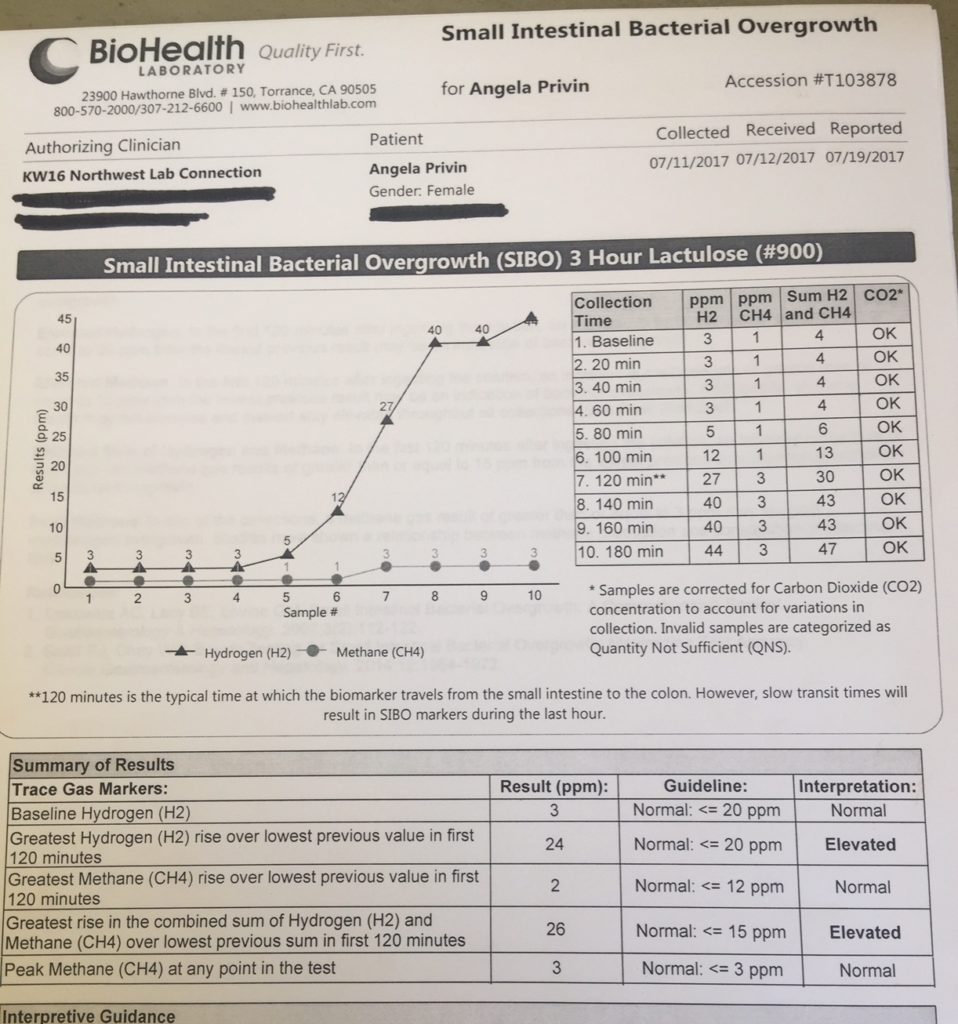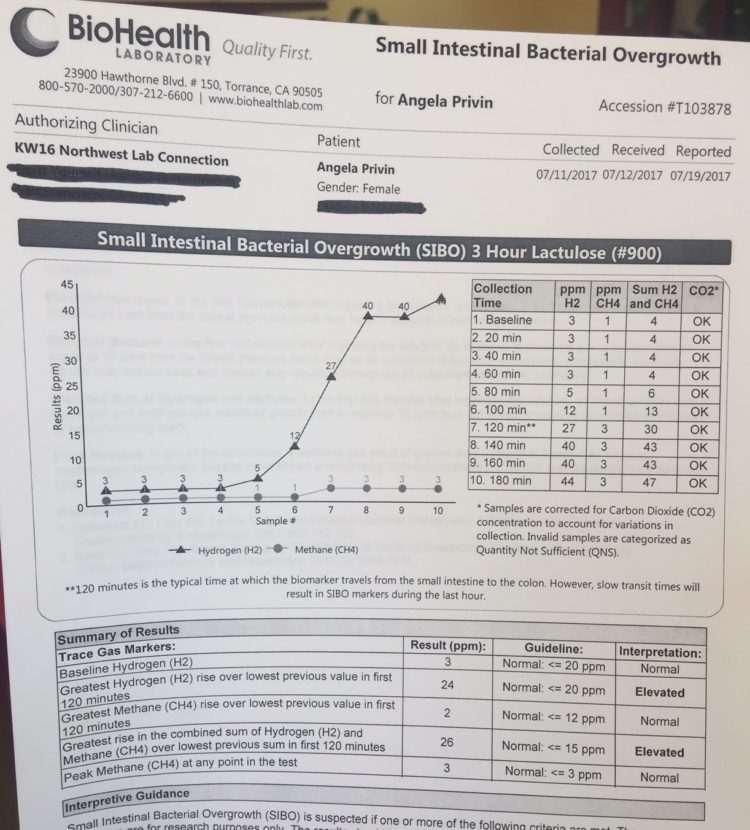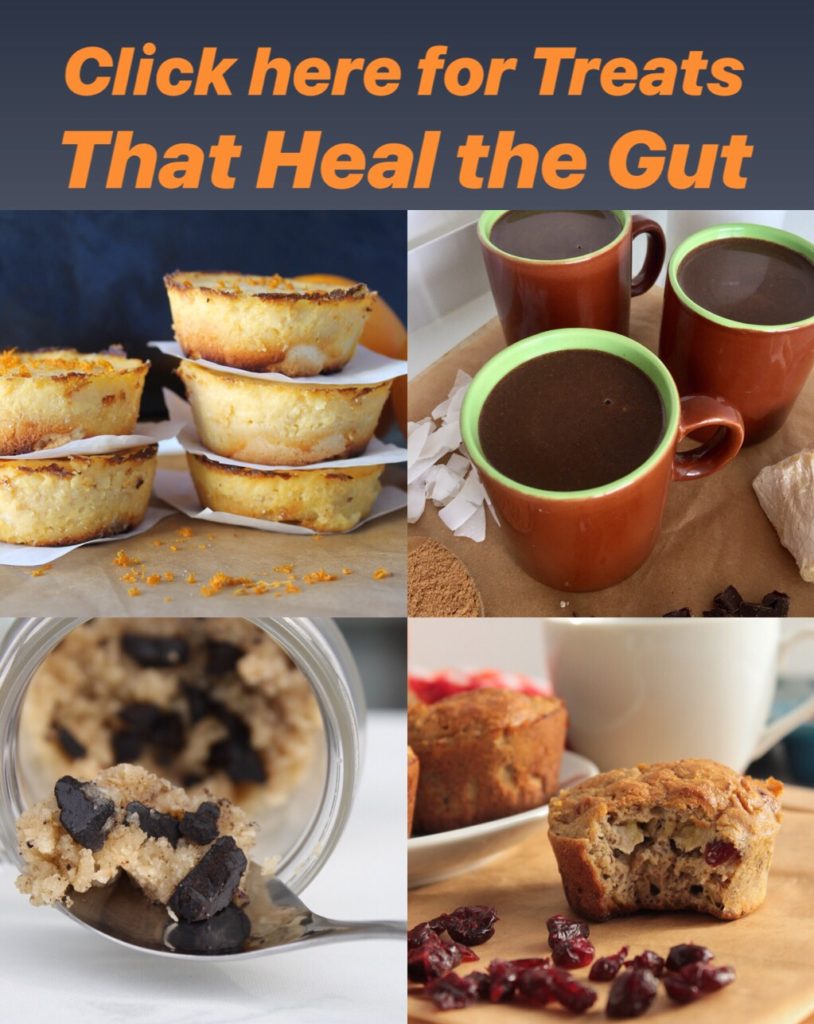I’m coming to the end of my SIBO journey.
Though it’s NOT been fun, I’ve learned a ton from my experience.
Having SIBO myself helped me get clear about what’s important in treating it. And it’s not the perfect antimicrobial or prokinetic. It’s so much more than that! There’s such a huge emotional aspect that makes all the difference. But more on that later.
There’s also important physical stuff.
I changed my diet and carb intake with SIBO. In the process I’ve become fat adapted, which means my body burns fat for energy instead of sugar, so I’ve stabilized my blood sugar, am not as hungry, don’t snack all the time time and don’t crave sweets.
After my first negative SIBO test 2.5 months back I’ve been following a low FODMAP diet. Lately I’ve been slowly adding FODMAPs back in. But before I launch back into a full Paleo diet it’s important to take the lactulose breath test one more time to see if it’s ready for a full FODMAP diet.
People either love testing or do anything to avoid it. I am in the first camp. I want to have the full picture. The hard data of what’s going on inside my gut helps ease my anxiety.
The worst part about the SIBO test is the 24 prep fast, a bland mix of protein, white rice and broth with no spices or salt. Depressing and boring if you love to eat. But it’s worth it.
The first time I took the test this February, I had off the charts hydrogen dominant SIBO. You can see my results here. Because I took the test within a month of symptoms starting I was able to quickly address it.
Based on my gas levels, I was supposed to take antibacterial herbs for 4 months.
I did a 6 week herbal protocol and retested at the 2 months mark. My SIBO was gone. You can see the results here.
I am so glad I tested early because my overgrowth was gone and I could move on to the diet maintenance phase for the next 2 to 3 months. If I continued my herbs for 4 months without retesting I would have started doing damage to the beneficial bacteria in my large intestine.
Post SIBO maintenance phase
So here’s the scoop on the maintenance phase after clearing SIBO. It’s just as important as the treatment.
For the next 2 to 3 months I continued my low FODMAP diet, taking prokentics (I started with 3 capusles of this every night during treatment and then switched to 60 drops of this one nightly after treatment) and 1 digestive enzyme with every meal. I also treated myself for hpylori for 30 days, with Matula tea and broccoli sprouts. I’ve also stayed on my SIBO friendly probiotics.
Retesting at the end of the maintenance phase is essential for SIBO because it’s notorious for coming back. But if you catch it before it has a chance to overwhelm your system, you have a much better chance of eradicating it.
My test gave me a piece of mind because there’s been a lot of SIBO-related anxiety every time I had a weird sensation in my belly.
Only 1/3 of people kick SIBO the first time around, and knowing that disturbed to me.
Additionally, I had an episode a few week back where I ate a perfectly innocent low FODAMP dinner of butternut squash, homemade basil pesto and chicken and got severely bloated afterwards. But so did my husband. It was odd and it freaked me out.
For a few weeks after that incident my digestion was off. And of course I assumed it was a relapse. Instead of testing right away, I decided to wait another month to when I originally planned to take it and address my unhappy belly in the meantime.
First I focused on calming down so I could think clearly. It helped. I have a lot of practices I use to ease my stress response like chi gong, yoga nidra and acupuncture. Then I was in a place to follow my intuition.
Instead of taking antibacterial herbs, I decided to give my digestive system a rest. For two weeks I ate less food, less frequently and mostly easy to digest things like broth, eggs, soups, stews and smoothies, blended or pureed.
I also focused on reducing my stress about the situation. That was the hardest part. But my efforts worked, because my digestion slowly returned to normal.
Last week I took the SIBO retest. Super nervous about the results. So what were they?
My SIBO test results

My results were not straight forward. Luckily I knew how to read them. And it was an opportunity to teach you about false positives with the lactulose test.
My breath test results had the dreaded words “ELEVATED” on it. At first glance you could assume that my test was slightly positive for SIBO.
But this is why it’s likely a false positive.
It’s important to not just look at the interpretation box below, but also to read the chart above.
A SIBO positive shows a double peak on the chart. A rise in the first 120 minutes, starting at the 60 minute mark and another rise in the last three sections of the test where the lactulose solution hits the large intestine.
I did not have a double peak. My gas values slowly rose overtime, peaking at the 140 mark.
If I had very slow transit, usually characterized by constipation, you could interpret this test as positive. But I don’t.
Also lactulose is a prokinetic, prescribed to constipated people to speed up their transit time. So there’s a good chance that it did this to me and that by the time the lactulose hit the 120 mark it likely entered my large intestine, where a spike would be natural and expected.
So since my only out of range value was at the 120 minute mark you can’t use it to conclude a definite positive. Based on my lack of symptoms to back it up, this is even less likely to be a positive. Interpreting this as a positive based on one delayed data point would cause unnecessary stress and treatment.
It’s not a bad idea to get a second opinion your SIBO test if your practitioner is not a SIBO expert.
I am interpret this test to mean I am SIBO free and I can eat cauliflower, onions, garlic, cashews and apples again.
Now what?
This test helps dispel some anxiety. Now all those grumbles and less than perfect digestion is just the body working it’s weird and wacky way. A little bit of gas doesn’t signify a relapse.
I need to shift my focus on what’s working in my body, in an effort to keep anxiety at bay.
I notice the more I focus on fixing myself the worse I tend to feel. My gut wants to be left alone to do it’s thing.
We tend to think we’ll be happy and calm when we feel better, but perhaps we’ll feel a bit better when we’re happier and calmer?
Finding some sort of peace and stability while you are in the midst of your health crisis is actually going to help you feel better and make you happier.
IBS is not in our minds, but working on mind and emotion is a major support to recovery. It’s often the missing piece. Your belly reacts to how you think and feel. It takes cues on how to function from what you believe.
This is the part of healing that we all have control over, yet it is the hardest to work on because it’s so emotional. You don’t do it alone. You get help. You develop some supportive practices. You give it a bit of attention instead of jumping on Google to do more health research, which ultimately makes you more anxious and confused.
This is what I’ve learned in all my years of health coaching. It you ignore the mental and emotional component the body will not respond fully to any treatment. So while it may not be in your head, your head and heart are certainly a part of it.
Working will all of it will bring the greatest results.
SIBO is a condition of stagnation in the small intestine. The bacteria won’t move through like they should.
Where else in your life are you stagnating or stuck? Jobs, relationships, recurrent emotion or thoughts? Stuck in fear, hopelessness, trauma?
Dealing with this is part of addressing IBS or SIBO.
Get to know yourself better, where are you stuck? The healing is usually deep inside, not on website pages.
I was stuck in a job that challenged my boundaries constantly. I understand that I have to protect my boundaries much better, both energetically and emotionally. And I have been. It’s part of my plan to keep SIBO at bay.
If SIBO does return, here’s what to do.
Here’s what not to do. Panic and get depressed.
Have a good plan, believe in yourself. You can handle the diet, the treatment, the self care. Perhaps you just need a tune up every once in a while and a reminder to take care of yourself.
In my professional opinion and experience, the less you or I worry, panic or obsess, the less likely SIBO will return.
 Angela Privin is proof that IBS is NOT an incurable disease or a disease at all. IBS is a body out of balance. It’s an invitation for change. After solving her own IBS mystery more than a decade ago Angela trained as a health coach to help others.
Angela Privin is proof that IBS is NOT an incurable disease or a disease at all. IBS is a body out of balance. It’s an invitation for change. After solving her own IBS mystery more than a decade ago Angela trained as a health coach to help others.
Angela uses both science and intuition to help people figure out what’s out of balance in their body. She works with lab tests, dietary changes, supplementation and nervous system rebalancing. Get help rebalancing your digestive system and solving your IBS mystery here.







Recent Comments